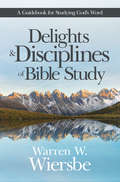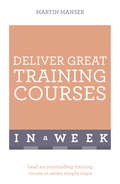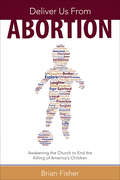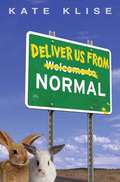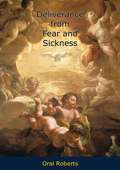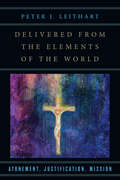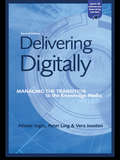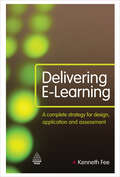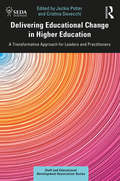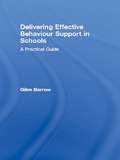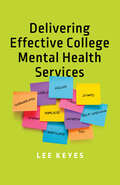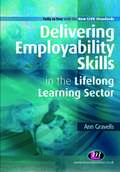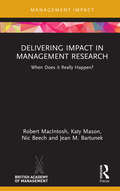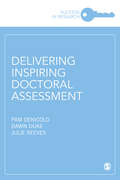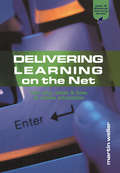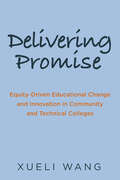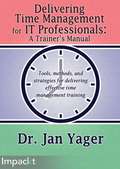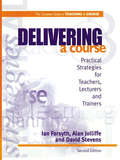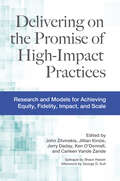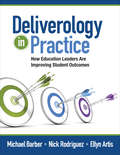- Table View
- List View
Delighting in God's Law: Old Testament Commands and Why They Matter Today - A 6-Week Bible Study
by Kristie AnyabwileUnderstanding and delighting in God&’s law? Sign me up!Have you ever skipped over or given up on books of the Bible like Numbers or Leviticus? These laws, rules, and rituals can feel daunting and confusing. What was the purpose of God&’s laws for the people of Israel, and what can Christians learn from them today?Teacher and lover of God&’s Word, Kristie Anyabwile invites you to join her in this six-week study of understanding the often-overlooked Old Testament books of the law.In Delighting in God's Law, participants discover the context and purpose of God&’s commands, uncover clues that help us see the intent of the law, and explore ways to appropriately apply God&’s Word to our lives.The law was not just for those people back then. It is for believers today. Kristie removes the dread and disillusionment often associated with studying God&’s law. You don&’t have to be daunted by His law. You can be delighted by it!
Delights and Disciplines of Bible Study: A Guidebook for Studying God's Word
by Warren W. WiersbeBestselling author, pastor, and radio host Dr. Warren W. Wiersbe shares his delight in God’s Word in this comprehensive, highly accessible guide to biblical interpretation and application. In Delights and Disciplines of Bible Study, Dr. Wiersbe offers insight into the history, meaning, and context of the entire Bible, from Genesis through the Gospels through the last words of the apostles. As readers develop skills in studying the Bible, they will also experience the joy of richer spiritual devotion. As Dr. Wiersbe writes, reading the Bible should never be a burden. Instead, it is an adventurous journey into the heart of God.
Deliver Great Training Courses In A Week: Lead An Outstanding Training Course In Seven Simple Steps
by Martin ManserTraining just got easierYou have probably been on both good and bad training courses. Unfortunately, it may be the bad ones that you remember - perhaps the content was badly ordered, the arrangements were poor, the speaker was boring. How can you prepare for and lead an outstanding training course? In this book we will show you how.Sunday: What is training? What are you aiming to achieve? What are the basic different styles in which colleagues learn - and in which trainers train? What overall points should you consider and what practical arrangements do you need to think about, for example on timing and venue?Monday: Identify the training needs clearly How to analyse participants' training needs, using various sources; use the needs to define clear learning outcomes that are both SMART and also relevant to participants' real work and jobs.Tuesday: Design the course carefully How to continue to prepare well: think about the points you want to communicate and order them clearly; find a fresh angle; be motivational, inspirational and practical; write a strong beginning and round off your training well at the end.Wednesday: Plan variety creatively Why the need to change the style of training regularly throughout the session is important to maintain participants' interest and involvement; plan variety; consider different ways to encourage group participation; use visual aids and PowerPoints effectively.Thursday: Implement your plan successfully Go for it! Put all your preparation into practice on the day itself. How will you make a good first impression and make the most of informal times? Body language is important; how will you overcome nerves? Learn how to deal with difficult people.Friday: Evaluate the training thoroughly Why identifying what went well and what didn't go so well is important; checking on 'learning' after the course is essential to determine changed attitudes, behaviour patterns, and so on. Review your training to see if it had its desired effects: if not, reassess and begin the process again.Saturday: Refine your skills constantly You have completed your training course and evaluated it; now learn how to cultivate the qualities of a professional trainer, for example by keeping up to date with your subject, learning from your mistakes and mentoring a colleague to lead training courses.
Deliver Us From Abortion: Awakening the Church to End the Killing of America's Children
by Brian FisherThe author of Abortion: The Ultimate Exploitation of Women offers a blueprint for the American Church to handle abortion in our country.Consider that for the past forty years, a staggering fifty-six million Americans have been killed by abortion. It claims the lives of over 1.2 million children every year, or roughly one child every twenty-five seconds. So why isn’t the American church doing something to stop this atrocity, which is the greatest holocaust in American history? The majority of American churches, God’s institutions for spreading the gospel of peace and defending the weak and innocent, remain silent. Feeding the poor, stopping human trafficking, rescuing children from abuse, and protecting women from exploitation are all issues the church is addressing. Yet abortion remains eerily absent from the list of church priorities in America. Why isn’t it the church’s highest priority? Is the American church silent because abortion has become politicized and church leaders are afraid to discuss it or because we simply don’t know what the Bible says about it? What will cause the church to wake up, rise up and take this issue to task to save our children?In his latest book, Deliver Us From Abortion, Brian Fisher, co-founder and president of Online for Life, breaks the veil of silence and uncovers the reality of abortion in the church, what the Bible really says about it, and how God has empowered His church to end this unspeakable tragedy.Praise for Deliver Us from Abortion“This book provides a powerful defense for the children who can’t speak for themselves.” —Josh McDowell, bestselling author of 138 books including More Than a Carpenter“Abortion is the greatest moral crisis of our generation, yet far too many churches have remained silent. In Deliver Us From Abortion, Brian Fisher offers a blueprint for the American church that is both instructive and encouraging. I pray that we can all hear and accept his challenge.” —Dr. Tony Evans, president, The Urban Alternative, senior pastor, Oak Cliff Bible Fellowship“Growing up in the King family during the Civil Rights era, I know what the church can accomplish. I am so glad Brian has written this book. May it challenge and equip the church to end the abortion holocaust in America.” —Dr. Alveda King, director of African-American outreach, Priests for Life
Deliver Us from Normal
by Kate KliseYes, there really is a Normal, Illinois. Charles Harrisong should know; he was born there. But life is difficult for Charles because his family isn't normal at all. They're poor, for one thing. They stand out, which is the worst thing. After an ugly incident at school, Charles and family leave Normal and begin an adventure that takes them to a houseboat that just might be their new home. And Charles begins a personal journey within his own heart; one that will ultimately deliver him both from and to himself.
Deliverance from Fear and Sickness
by Oral RobertsMIRACLE OF THE LENGTHENED LEGI SAW LITTLE WILLIE LOOKING SO lost and helpless. Something got hold of me, and I entered the room. I said, “Son, do you want to be healed?”Little Willie said, “Yes sir!”I was too tired to pray, so I just reached out with my forefinger and touched his forehead and prayed a brief prayer in the name of Jesus of Nazareth for God to heal the deformed leg of Willie Phelps. Then I left the building.The next day, Willie couldn’t go to school, because he had built-up shoe wouldn’t fit him. God had lengthened his leg two and one-half inches overnight. His mother took him to town and brought a normal pair of shoes, and for the first time in four years he walked without his crutches and without a limp.Willie arrived at school late that morning and when he walked in on normal shoes without his crutches, he almost broke up the school. He told his class what the Lord had done for him, and the teacher put her head down on the desk and cried like a baby….So Oral Roberts tells in his never-to-be-forgotten style the story of God’s mighty works in Deliverance From Fear and From Sickness.
Delivered from the Elements of the World: Atonement, Justification, Mission
by Peter J. LeithartIn Delivered from the Elements of the World Peter Leithart reframes Anselm's question, "Why the God Man?" Instead he asks, "How can the death and resurrection of a Jewish rabbi of the first century . . . be the decisive event in the history of humanity, the hinge and crux and crossroads for everything?" With the question reframed for the wide screen, Leithart pursues the cultural and public settings and consequences of the cross and resurrection. He writes, "I hope to show that atonement theology must be social theory if it is going to have any coherence, relevance or comprehensibility at all." There are no small thoughts or cramped plot lines in this vision of the deep-down things of cross and culture. While much is recognizable as biblical theology projected along Pauline vectors, Leithart marshals a stunning array of discourse to crack open one of the big questions of Christian theology. This is a book on the atonement that eludes conventional categories, prods our theological imaginations and is sure to spark conversation and debate.
Delivered: Experiencing God's Power in Your Pain
by Beth MooreBased on her bestselling book, Get Out of That Pit, and condensed for busy readers, Beth Moore delivers a stirring message of sheer hope, utter deliverance, and glorious freedom of God.When you find yourself in a &“pit&” of loneliness, anxiety, depression, and hopelessness, there is a way out. God is in the deliverance business. He longs for you to be free, to know the love and presence that are better than life—and the power of His Word that defies all darkness.In Delivered, Beth Moore discusses the three primary ways you can end up in a pit: you may be thrown in, you may slip in, or you may jump in! Beth shares her own journey out of the pit and the way the poetic expressions of Psalm 40 rewarded her with a new song for her soul given by her Savior.In this soul-stirring book, you&’ll find:Short chapters packed with wisdom and practical adviceEncouragement and hope for those struggling through hard timesPerfect for use as a devotional or for small group studyYou can be free from the worst life has to offer and learn to take Christ&’s mighty arm when he reaches into the depths of the pit you&’ve been stuck in. In Delivered, break through past hurts and find true peace and freedom at last.
Delivering Digitally: Managing the Transition to the New Knowledge Media (Open And Distance Learning Ser.)
by Peter Ling Alastair Inglis Vera JoostenThis text investigates courseware delivery where resources are based on the World Wibe Web and are computer-managed. It follows a structured approach and provides practical support on general principles, best practice, skills needed and decisions to be made.
Delivering E-Learning: A Complete Strategy for Design Application and Assessment
by Kenneth FeeDelivering E-Learning describes a new and better way of understanding e-learning. The author looks at overcoming objections to e-learning and acknowledging poor past practice before presenting a new strategic approach. It places the emphasis firmly on learning, not the technology, de-mystifying the jargon and de-bunking industry myths.The current way most people look at e-learning is flawed, and this means they are missing its full potential. This book provides a clear framework to better understand e-learning. Proposing a strategic approach to implementing e-learning, the author demonstrates how to align e-learning strategy with learning and business strategies. It offers a complete resource for applying e-learning to any organization.
Delivering Educational Change in Higher Education: A Transformative Approach for Leaders and Practitioners (SEDA Series)
by Jackie Potter Cristina DevecchiPresenting leadership of educational change in higher education as a dynamic, collaborative, and evolving area, Delivering Educational Change in Higher Education provides rich examples of how new ways of working are being adopted and adapted. It brings together leaders and practitioners, as authors and readers, to share their experiences of whole organisational change. Across the chapters, common threads highlight the importance of organisational context, of shared or distributed leadership, and the critical need for continuous learning in and on action by reflective readers. Linking case studies to a range of practical models and theories, this book: Explores established paradigms and models of change management and leadership. Offers examples from a diverse range of institutional contexts. Models critical reflective practice in the leadership of educational change. Addresses the future of educational developers working collaboratively with an increasingly diverse higher education workforce. Providing rare insights into ‘the what’ and ‘the how’ of change management and leadership, this book will be of interest to senior managers, educators, programme leaders, and educational developers who are all working in collaborative ways to enact positive change for student learning and experience.
Delivering Effective Behaviour Support in Schools: A Practical Guide
by Giles BarrowThis book is intended to help schools become increasingly inclusive. The advice and guidance is aimed at managers and practitioners providing behavior support, either through an LEA service, by outreach work from specialist centers or via on-site provision. You will find advice on developing effective support; planning, monitoring and evaluating support; working in partnership with colleagues in schools and other services; identifying resources to maximize behavior support interventions; and providing support staff with proven techniques for improving service delivery. There are lots of practical resources for implementing suggested strategies, examples of proformas and spreadsheet formats and other useful planning materials relating to behavior support. Managers of behavior support services should find this book particularly helpful, as will those staff providing behavior support from PRUs (Pupil Referral Units), on-site units and special schools. There will also be aspects of the book that will appeal to mentors and staff with pastoral responsibilities in mainstream schools.
Delivering Effective College Mental Health Services
by Lee KeyesAn essential guide to organizing and offering mental health services on campus.Stressed by increasing student demand for mental health services, campus counseling centers across the country are grappling with how best to deliver ethical, effective, and efficient service. Hampered by limited budgets, most centers find it deeply challenging to address growing college mental health service needs. Yet little conceptual training is provided to student affairs, higher education, health, and mental health professionals who deliver campus mental health services.In Delivering Effective College Mental Health Services, psychologist Lee Keyes aims to change that. He offers sound, field-tested advice for creating a congruent, cross-division, and service-oriented college counseling enterprise that best fits its campus culture and students. This useful handbook for administering counseling services• poses questions and offers practical advice to help college counseling centers form a consistent philosophical model• lays out conceptual groundwork for constructing college counseling services, from training activities to counseling/psychotherapy processes• takes into account the pressures (time related, economic, political, cultural) that strain universities• explains how to cultivate an accurate and empathic response to each individual, their entire history and context, and their possible life trajectoryWritten by a leading provider of college mental health services, Delivering Effective College Mental Health Services is an essential guide to organizing and offering mental health services on university and college campuses.
Delivering Employability Skills in the Lifelong Learning Sector (Further Education and Skills)
by Ann Gravells′Delivering Employability Skills′ is an optional unit of the teacher training qualifications. This easy-to-read and accessible text is aimed at trainees undertaking this unit, or existing teachers wishing to refresh their understanding of delivering employability skills as part of CPD. With practical activities and examples throughout, this book supports delivery of the subject in a variety of settings. Please note: the qualification unit content contained in the appendices has since changed, and some legislation mentioned in the book has been updated.
Delivering Impact in Management Research: When Does it Really Happen? (Management Impact)
by Nic Beech Jean M. Bartunek Robert MacIntosh Katy MasonImpact is of increasing importance to all researchers, given its growing centrality to those who fund, assess and use research around the world. Delivering Impact in Management Research sets out a detailed and nuanced analysis of how research impact is best delivered in practice. Starting with a rich conceptualisation, the authors move on to discuss models through which meaningful impact is framed and delivered. The book explains processes, skills and approaches to impact, along with examples and insights into potential pitfalls and solutions. Examples are drawn from around the world and systems such as the UK Research Excellence Framework (REF) are discussed as part of a key contribution to primary debates globally. A significant contribution to the long-standing discussion about relevance in business, management and organisation studies research, this concise book is essential reading for scholars and university administrators seeking to advance their understanding of delivering and demonstrating world-class research that matters.
Delivering Inspiring Doctoral Assessment (Success in Research)
by Julie Reeves Dawn Duke Professor Pam DenicoloThis book provides academics, trainers and supervisors worldwide the tools to effectively support doctoral students in the assessment process. Its multidisciplinary approach makes it a uniquely useful manual for the examination of works from conception to completion, and dissemination – in both formative and summative assessments. It gives clear guidance on: · How assessment is structured and conducted, · Activities and questions for the supervision of vivas and public debates, · How to manage assessment outcomes. This book equips early career assessors to effectively perform their duties and supportive roles, and is a valuable resource for doctoral students seeking insight into the rationale behind the ways in which their preparation is structured and delivered.
Delivering Inspiring Doctoral Assessment (Success in Research)
by Julie Reeves Pam Denicolo Dawn DukeThis book provides academics, trainers and supervisors worldwide the tools to effectively support doctoral students in the assessment process. Its multidisciplinary approach makes it a uniquely useful manual for the examination of works from conception to completion, and dissemination – in both formative and summative assessments. It gives clear guidance on: · How assessment is structured and conducted, · Activities and questions for the supervision of vivas and public debates, · How to manage assessment outcomes. This book equips early career assessors to effectively perform their duties and supportive roles, and is a valuable resource for doctoral students seeking insight into the rationale behind the ways in which their preparation is structured and delivered.
Delivering Learning on the Net: The Why, What and How of Online Education (Open and Flexible Learning Series)
by Martin WellerAs online education becomes more familiar, so the reality of using it in teaching and learning has moved beyond the realm of the specialist. Pedagogy and best practice Delivering Learning on the Net explores the reality of online education today. Martin Weller chaired the groundbreaking Open University course You, Your computer and the Net, which is now the largest for-credit online course in Europe. Based on this and his experiences elsewhere, the book is a comprehensive resource grounded in practical reality as well as in research. Key issues covered include:*the Net and its relation to education;*developing and implementing online courses;*the key issues surrounding online education.Teachers, trainers, technologists, administrators and decision-makers working in higher and further education will all find much of value in this book.
Delivering Promise: Equity-Driven Educational Change and Innovation in Community and Technical Colleges
by Xueli WangAn invigorating take on how community and technical colleges can center equity in fostering institutional transformation
Delivering Time Management for IT Professionals: A Trainer's Manual
by Dr Jan YagerIf you want to create an efficient and high performing team, use this book to help your employees develop strong time management skills that will bring personal and team success.
Delivering a Course: Practical Strategies for Teachers, Lecturers and Trainers (Complete Guide To Teaching A Course Ser.)
by David Stevens Ian Forsyth Alan JolliffeThis guide focuses on the problems associated with presenting material to learners. Designed to help teachers make the right decision about the presentation of course materials, it includes strategies for both groups and individuals, and advice on introducing change and coping with the unexpected.
Delivering on The Promise of Democracy
by Sukhwant JhajMany educators can recite the faults of their schools or universities, but far fewer can recognize and develop existing strengths to benefit a wider audience. Sukhwant Jhaj has crafted a refreshing new look at how imaginative leadership and a shift in perspective can propel institutions to reach at-risk or underrepresented members of their communities. Delivering on the Promise of Democracy pulls back the curtain on seven high-performing universities to reveal which daily decisions, including listening to the community, embracing conflict, and implementing effective strategies through routine, guide administrators in achieving exceptional results. Through in-depth interviews that offer a close look at these seven universities, Jhaj traces a new trajectory for higher education: a call to question a university's effectiveness through its accessibility to the community it serves. <p><p> Jhaj's book will inspire anybody interested in widening access to education with its call to renew their institution's mission through powerful and effective leadership.
Delivering on the Promise of High-Impact Practices: Research and Models for Achieving Equity, Fidelity, Impact, and Scale
by Jillian Kinzie John Zilvinskis Jerry Daday Carleen Vande ZandeResearch shows that enriching learning experiences such as learning communities, service-learning, undergraduate research, internships, and senior culminating experiences – collectively known as High-Impact Practices (HIPs) – are positively associated with student engagement; deep, and integrated learning; and personal and educational gains for all students – particularly for historically underserved students, including first-generation students and racially minoritized populations. While HIPs’ potential benefits for student learning, retention, and graduation are recognized and are being increasingly integrated across higher education programs, much of that potential remains unrealized; and their implementation frequently uneven. Colleges are eager to use the HIP nomenclature for recruitment, promoting equity for traditionally underserved student populations, and preparing lifelong learners and successful professionals. However, HIPs defy easy categorization or standardized implementation. They rely on fidelity, quality, and consistency – being “done well” – to achieve their learning outcomes; and, above all, require attention to access and equity if they are to fulfill their promise of benefitting all student populations equally.The goal of Delivering on the Promise of High-Impact Practices is to provide examples from around the country of the ways educators are advancing equity, promoting fidelity, achieving scale, and strengthening assessment of their own local high-impact practices. Its chapters bring together the best current scholarship, methodologies, and evidence-based practices within the HIPs field, illustrating new approaches to faculty professional development, culture and coalition building, research and assessment, and continuous improvement that help institutions understand and extend practices with a demonstrated high impact. For proponents and practitioners this book offers perspectives, data and critiques to interrogate and improve practice. For administrators it provides an understanding of what’s needed to deliver the necessary support.
Deliverology 101: A Field Guide For Educational Leaders
by Sir Michael Barber Andy Moffit Paul KihnA step-by-step approach to delivering results Michael Barber, former chief advisor on delivery to British Prime Minister Tony Blair, and his colleagues thoroughly describe his proven reform delivery processes in this practical field guide. Citing education reform case studies from more than 20 countries, he asserts that most previous reforms were unsuccessful due to failed implementation. The central challenge is getting it done. This book focuses on how to accomplish meaningful results, including: Significant and ongoing education reform Excellence and equity across public education Students who are prepared to lead America’s future
Deliverology in Practice: How Education Leaders Are Improving Student Outcomes
by Michael Barber Nickolas C. Rodriguez Ellyn ArtisEverything you need to implement school change that gets results! If you’ve been wondering how to effectively lead and manage results-driven, system-wide implementations, look no further. Internationally recognized education expert Michael Barber explores exactly how to translate policy into practice for long-term, measurable results. Building on his groundbreaking book, Deliverology 101, Barber provides proven methods and clear steps to achieve successful policy implementation and offer practical solutions for reviving stalled reform efforts. New cases studies and embedded links help you develop a delivery "skillset" for building capacity, effective coalitions, and a coherent, flexible plan for implementation. Leaders and staff at both national and local levels will learn to: Establish a Delivery Unit to set clear, measureable goals and build a reform coalition Understand delivery through data analysis and strategic progress monitoring Plan for delivery with explicit, day-to-day implementation planning updated with proven methods from years of practice Drive delivery with progress monitoring, momentum building, and course corrections Create an irreversible delivery culture by identifying and addressing challenges as they occur Don’t leave your education policy implementation to chance. Use this new field guide to get your implementation on the right track today!

